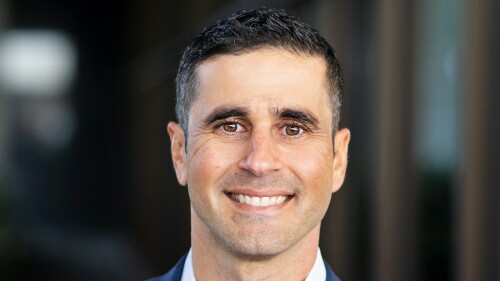In 2003, Andrew B. Turner was a senior at Berkeley High School in Berkeley, California, when a new interactive program that challenged students to create a development scenario for a local neighborhood made its debut. Nearly 15 years later, Turner is now a project director at Argent LLP, one of London’s most respected developers, where he plays a key role in the Brent Cross mixed-use regeneration project, a joint effort between Argent and Related, a U.S.-based real estate development and investment firm. He is also a volunteer with UrbanPlan U.K., and helped to bring the program to the Whitefield School, a secondary school in Brent Cross, which itself is planned to be redeveloped. Inside ULI spoke to Turner about his experiences as an UrbanPlan participant and how they shaped his career choice and outlook.
Inside ULI: Welcome, Andrew. Can you talk more about your experience in the first UrbanPlan workshop at Berkeley High?
Andrew: At the time, I didn’t realize that it was a pilot program since it came across so organized! Different places were named for the ULI members who had started the program and were in the room putting on the pilot—“Nahas Heights,” for example. [ULI Foundation governor Ron Nahas cofounded UrbanPlan along with the UC Berkeley Haas School of Business.] This experience piqued my interest in urbanism and urban development. Even though we were all assigned a role during the workshop, I knew then that I wanted to be more of a generalist and wrap my head around all of the elements and how they connect in creating one physical place. In our proposal, we tore the rules up a bit by paving over streets and making them pedestrian thoroughfares. We presented our idea to the city council (composed of ULI member-volunteers), and our project won! When the council interviewed each team member, I thought I could see myself doing this as a career, and I genuinely have. So, that initial experience in high school has stuck with me all these years.
Inside ULI: After high school, how did you pursue your interest in urban development?
Andrew: I ended up pursuing urban studies at the University of Pennsylvania, which, at the time, was trying to figure how the campus could fit better into the city of Philadelphia, and how the university could use its development and facilities program to improve its part of west Philadelphia, rather than bulldoze it, which is what it was perceived to have done in the past. It was a great time to be there. I saw the city as my laboratory, and the experience confirmed my desire to work on these types of issues and also to help bring people into the development process, who otherwise saw it as detached and exclusive. Growing up in Berkeley, I was always focused on big philosophical issues like free speech. A career in urban development has allowed me to take my progressive politics to a level where I could see, feel, and do something about some of these social justice and equity issues I’ve always cared about.
After graduating, I spent time in Havana, Cuba, to learn about some of the urban development challenges in that fascinating city. I worked briefly as a lobbyist in Washington, D.C., on improving U.S.-Cuba relations, and then I returned to the Bay Area to work at BRIDGE Housing, where I was an assistant project manager for three years building high-quality affordable housing. I then decided to pursue graduate work at the London School of Economics; after graduating, I was hired by Argent to help lead the regeneration of Brent Cross, a major mixed-use project that spans 190 acres [77 ha] and 15 million square feet [1.4 million sq m] of development that will include 7,500 new homes, new retail and commercial spaces, new public infrastructure, pedestrian/cycling networks, schools, and amenities for the neighborhood.
Inside ULI: What are some of the early lessons from that first UrbanPlan workshop you’ve seen play out in your work today with Argent and the Brent Cross project?
Andrew: What the UrbanPlan workshop does is give you a survey of all the factors that need to be considered during a redevelopment project. As a high school student, you might be interested in cities and study economics, but there isn’t a field of study that allows you to fully discover how it all comes together and how to bring it fully into practice. The workshop allows you to sort out all the competing interests and try to put forward a proposal to do something to address them, which makes you feel like your decisions and choices matter.
In many ways, I’m doing something very similar in my current position—trying to understand the intersection of public and private interests and working with local stakeholders to build consensus around a vision. As the project operations director, I’m at the razor’s edge of that intersection and attempting to balance these competing concerns with our local authority partners. An idea that the UrbanPlan program introduced to me is the need to think about making a great place. It’s not just about how much profit you can make, or how tall you can build, or even if you deliver the homeless shelter, but about the whole impact of the development on its immediate surroundings. Placemaking is another name for it, and is in fact what Argent has come to be known for in London. The more open, exciting, and safe the public realm is, the more successful and valuable a place will be. So you do have to think about building in the public benefits early on. It’s the public squares, the schools, the open spaces that build up your values. That’s the type of open city I want to live in and to help create.
I don’t think you can think of it as a zero-sum game—private versus public; affordable versus market-rate—but rather ways in which you can align interests, build consensus, and deliver things that benefit a wide range of constituents.
Inside ULI: Describe how you got involved as an UrbanPlan volunteer, first in San Francisco and now in the United Kingdom.
Andrew: Before I moved to the U.K., I volunteered with the UrbanPlan program through ULI San Francisco. The program was expanding to different schools. I attended a series of workshops and helped with volunteer trainings.
In the U.K., we had the opportunity to bring the UrbanPlan workshop to the Whitefield School, a secondary school in Brent Cross that is part of the redevelopment area. Following the workshop, we shared with the students plans for their school and the community. I think UrbanPlan helped them see it in a new light, and that’s something we’re trying to expand to start a Youth Leadership Group for the regeneration.
It was the first opportunity I had to hear directly from young people in London what they think about urban development issues, in a place which is really under pressure from development. Since the workshop is compressed to a single day in the U.K., the students did have to make certain flash judgments, and a lot of honesty came out of that. The quality of the student participation across the board was really good. The presentations were all impressive and well considered, despite the short timescale.
However, the winning group did show a level of sophistication about their ideas that surpassed the others. They understood each element of the project and how they fit together, from retaining a heritage building to building new homes, schools, and community centers and how each could have a bigger impact on the community. They balanced how different people would be affected. They saw how their proposal could make a difference especially for students and young people, but for others in the community as well. They got it in a way that was authentic and nuanced; it reminded me of my excitement at the same age. Here I was, halfway across the globe, with UrbanPlan back in my life—it took my breath away!
Interested in volunteering or sponsoring UrbanPlan? Learn more about UrbanPlan program in North America and UrbanPlan UK.



![Western Plaza Improvements [1].jpg](https://cdn-ul.uli.org/dims4/default/15205ec/2147483647/strip/true/crop/1919x1078+0+0/resize/500x281!/quality/90/?url=https%3A%2F%2Fk2-prod-uli.s3.us-east-1.amazonaws.com%2Fbrightspot%2Fb4%2Ffa%2F5da7da1e442091ea01b5d8724354%2Fwestern-plaza-improvements-1.jpg)


